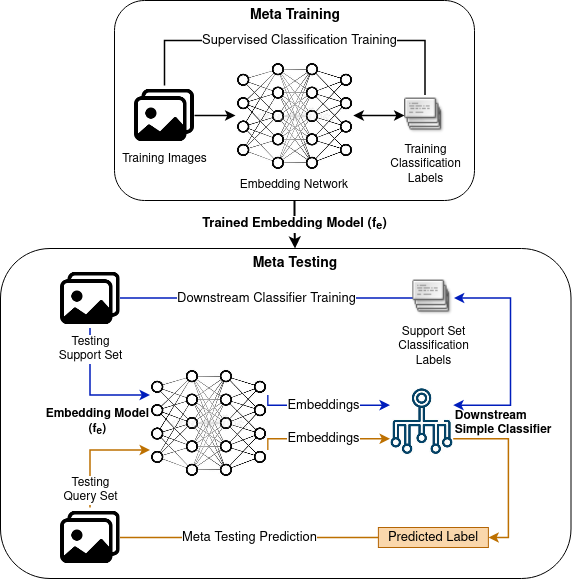Model building, experiments, references and source-code for the research work on skin image analysis using few-shot learning.
Link to the Research Paper Preprint
If you find our work useful in your research, cite us:
@article{https://doi.org/10.48550/arxiv.2210.16954,
doi = {10.48550/ARXIV.2210.16954},
url = {https://arxiv.org/abs/2210.16954},
author = {Desingu, Karthik and P., Mirunalini and Chandrabose, Aravindan},
keywords = {Computer Vision and Pattern Recognition (cs.CV), Artificial Intelligence (cs.AI), Machine Learning (cs.LG), FOS: Computer and information sciences, FOS: Computer and information sciences},
title = {Few-Shot Classification of Skin Lesions from Dermoscopic Images by Meta-Learning Representative Embeddings},
publisher = {arXiv},
year = {2022},
copyright = {Creative Commons Attribution 4.0 International}
}
This work proposes a two-stage approach: a baseline supervised learner on the meta-training set that allows a network to learn highly representative and generalizable feature embeddings for images, that are readily transferable to new few-shot learning tasks; positing that a representative feature embedding can be more effective than complex meta-learning algorithms, a simple linear classifiers is trained atop these representations.
- Proposes the use of meta-learning techniques for efficient model adaptation for extremely low-data scenarios
- Applies Group equivariant convolutions (G-convolutions) in place of the normal spatial convolution filters
- Two network implementations:
- Reptile: Gradient-based meta-learning
- Prototypical networks using Euclidean Distance
- Evaluated on ISIC 2018, Derm7pt and SD-198 datasets
- Outperforms DAML on ISIC 2018
- Implementation Code NOT available
- The paper that proposed Relation Networks for Few-Shot Learning
- The paper that proposed Protoypical Networks for Few-Shot Learning
[Elsevier-PR-2020] Temperature network for few-shot learning with distribution-aware large-margin metric
- An improvement of Prototypical Networks, by generating query-specific prototypes and thus results in local and distribution-aware metric
- Sets different temperature for different categories to penalize query samples that are not close enough to their belonging categories.
- Code available - PyTorch
